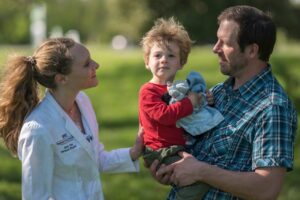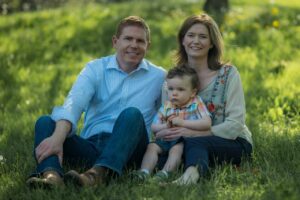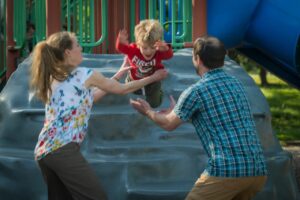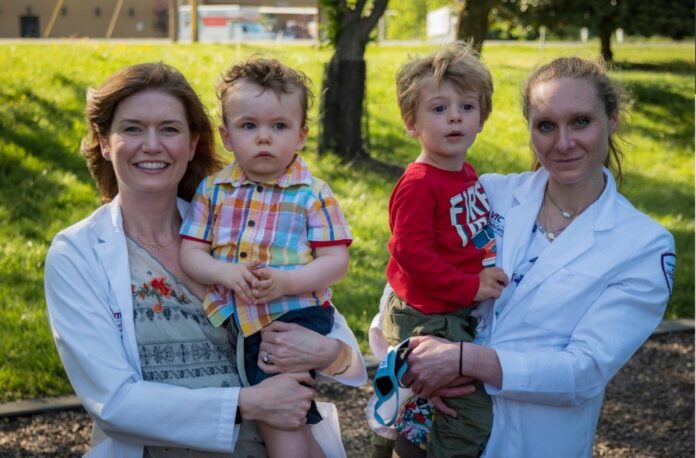Nerves are common on the first day of medical school. Will the curriculum be as tough as expected? What will my classmates be like? For two students at the Virginia Tech Carilion School of Medicine (VTCSOM), their first day almost three years ago brought additional stress. They also were about to be new moms.
“My due date was right around the time school was starting. Some people told me I should defer a year, but I had waited so long to be here and I was so excited that it didn’t matter what anybody said. I just wanted to start medical school and be able to pursue what I wanted to do for my whole life,” said Jane Gay, now a third-year student at VTCSOM.
Gay’s new classmate, Rebecca King, was also pregnant that first day, but was much earlier on with no apparent baby bump. “I remember seeing Jane on our first day of orientation and she was visibly pregnant,” King said. “I went up to her and, I think she thought I was being rude, but I thought, I’m so excited. I’m not the only one.”
“I still remember when Rebecca came up to me. I had never met her before, so I had no idea that she was pregnant. And, I was scared out of my mind. To be completely honest, I felt really alone,” Gay said. “Then Rebecca told me she was pregnant too. The feeling of loneliness lifted, knowing that someone else was also going through it.”
Gay had her baby, Desmond, a couple of days later. She only missed the end of orientation week and was back the following Monday to start the first official week of studies with her class.

“I was so happy to be in medical school and at VTCSOM. I really wanted in my heart to make it work, and I would do anything that it took, even if that meant staying up all night and getting no sleep,” Gay said. “It was hard though.” Gay’s significant other, Kevin, was able to stay at home with Desi as she returned to school quickly.
King had a little bit more time to get acclimated, completing more than half of the first year of study. “At that point, I knew more about how med school works, how to study, what the schedule is like, what the expectations are. I had a sense of what I needed in order to stay caught up while I was out,” King said. “I felt really supported by all my classmates. We had a great time guessing when I would actually deliver. There was a whole white board with everybody’s guess of the due date and time.”
When her son George arrived, King took a couple of weeks off, but came back quickly in order to stay on track. Her husband, Chris, is self-employed and works from home. He was able to adjust his work to care for George so King could get back to her studies. Her classmates also supported her during the two-week leave and the transition back. “My PBL [problem-based learning] group recorded all their sessions for me so that I could watch them while I was out. Even when I came back, the research class allowed me to do it online the last couple of weeks of the block.”

Gay also felt encouraged by the school community. “Everyone was so welcoming and helpful. I remember my first PBL group helped me get up to speed and filled in the gaps I missed during the remaining orientation week. And, every time I brought Desi to school, our classmates played with him and were genuinely excited to see him. I’m very grateful; we truly couldn’t ask for better classmates or more supportive people to be around.”
King and Gay also found a support system in each other. “Even just the simple fact of having someone to pump with,” King said. Gay added, “Some of our best memories are sitting in the pump room and pumping together, which sounds crazy.”
Many times pumping together was spent focused on their studies. “We could study, quiz each other,” Gay said. But, it became more than being productive. “You just didn’t feel alone. I think that was helpful too, for my mental health, helping remember what drives you. Having each other just helped,” King said.
The Virginia Tech Carilion School of Medicine has had other students become new moms and dads during their tenure at VTCSOM, but Gay and King are the first women to give birth during their first year of study.
As a non-traditional applicant with a previous career, King knew she wanted to have a baby during medical school when she applied. The small class size at VTCSOM, with fewer than 50 students per class, was a factor she considered when deciding where to attend. King believed this environment would allow her to balance her desire to become a physician with her desire to start a family.
“I felt like I was empowered here because of it being small. I could have conversations with school leadership, faculty, and staff and really let them know what I need, because I knew they wanted me to succeed,” King said. “I think sometimes either we don’t know what to ask for, or we don’t feel like we can ask for something. We should empower women to ask for what they need to be successful in both career and home life.”
“Balancing motherhood and medical school has been difficult and quite stressful at times,” Gay added. “It has taken hard-work, determination, sacrifice, and a strong support system to make it possible. There is no sugar coating that, but I am doing what I love, which makes it worth it.”

Both women are nearing the end of their third year of medical school, often viewed as a more challenging year when students rotate through major specialties within the hospital and outpatient clinics. This year was even more complicated because of schedule changes and protocol related to the COVID-19 pandemic. They will apply to residency programs next year. Both are open to pursuing a couple different specialties, but add that becoming a mother has shifted their perspective.
“Having a baby changed me, and I wasn’t expecting it. Some things in medicine are more emotional than I feel they would have been before I was a mom,” King said. “I feel like some people might look at it as weakness, but I’ve had some of the faculty tell me to see it as more of a strength.”
Gay echoed the sentiment, remembering what a physician said when she was a medical scribe before beginning medical school. “Crying in front of a patient who is in an unfortunate situation is absolutely not a weakness. It shows that you care. I think the more that we care about our patients and we relate to them, the better job we’re going to do for them. I think being a mom has allowed me to relate to people on a different, deeper level.”

